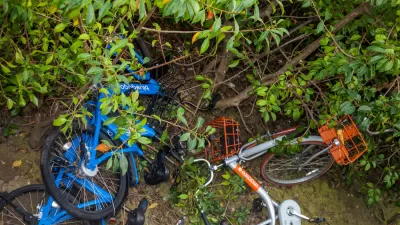News of the demise of the Pronto! bikeshare system in Seattle broke in February, but by the end of the year, the city is expected to have the U.S.'s largest bikeshare network.

Matt McFarland reports:
Fewer than five months ago, Seattle shut down its struggling municipal bikeshare system that had been propped up with taxpayer dollars. But in the last month, three innovative bikeshare companies have launched in the city, quickly eclipsing the past failure.
According to McFarland, Seattle now has more bikes available, rides are cheaper, more rides are being taken, and the city government "will be receiving substantially more data on these bike trips, to better plan local transportation."
"By year's end, Seattle is on pace to have the U.S.'s largest bikeshare network. And all of this happened without a penny of taxpayer funding," adds McFarland.
So what was the magic ingredient that said voilà! instead of Pronto!? That would be privately owned and operated dockless bikeshare. Seattle was one of the first cities to allow such systems, in this case LimeBike and Spin, while other cities like San Francisco and New York have proven resistant to the idea.
FULL STORY: How Seattle morphed from bikeshare failure to industry leader in five months

Study: Maui’s Plan to Convert Vacation Rentals to Long-Term Housing Could Cause Nearly $1 Billion Economic Loss
The plan would reduce visitor accommodation by 25,% resulting in 1,900 jobs lost.

North Texas Transit Leaders Tout Benefits of TOD for Growing Region
At a summit focused on transit-oriented development, policymakers discussed how North Texas’ expanded light rail system can serve as a tool for economic growth.

Why Should We Subsidize Public Transportation?
Many public transit agencies face financial stress due to rising costs, declining fare revenue, and declining subsidies. Transit advocates must provide a strong business case for increasing public transit funding.

How to Make US Trains Faster
Changes to boarding platforms and a switch to electric trains could improve U.S. passenger rail service without the added cost of high-speed rail.

Columbia’s Revitalized ‘Loop’ Is a Hub for Local Entrepreneurs
A focus on small businesses is helping a commercial corridor in Columbia, Missouri thrive.

Invasive Insect Threatens Minnesota’s Ash Forests
The Emerald Ash Borer is a rapidly spreading invasive pest threatening Minnesota’s ash trees, and homeowners are encouraged to plant diverse replacement species, avoid moving ash firewood, and monitor for signs of infestation.
Urban Design for Planners 1: Software Tools
This six-course series explores essential urban design concepts using open source software and equips planners with the tools they need to participate fully in the urban design process.
Planning for Universal Design
Learn the tools for implementing Universal Design in planning regulations.
Ascent Environmental
Borough of Carlisle
Institute for Housing and Urban Development Studies (IHS)
City of Grandview
Harvard GSD Executive Education
Toledo-Lucas County Plan Commissions
Salt Lake City
NYU Wagner Graduate School of Public Service




























